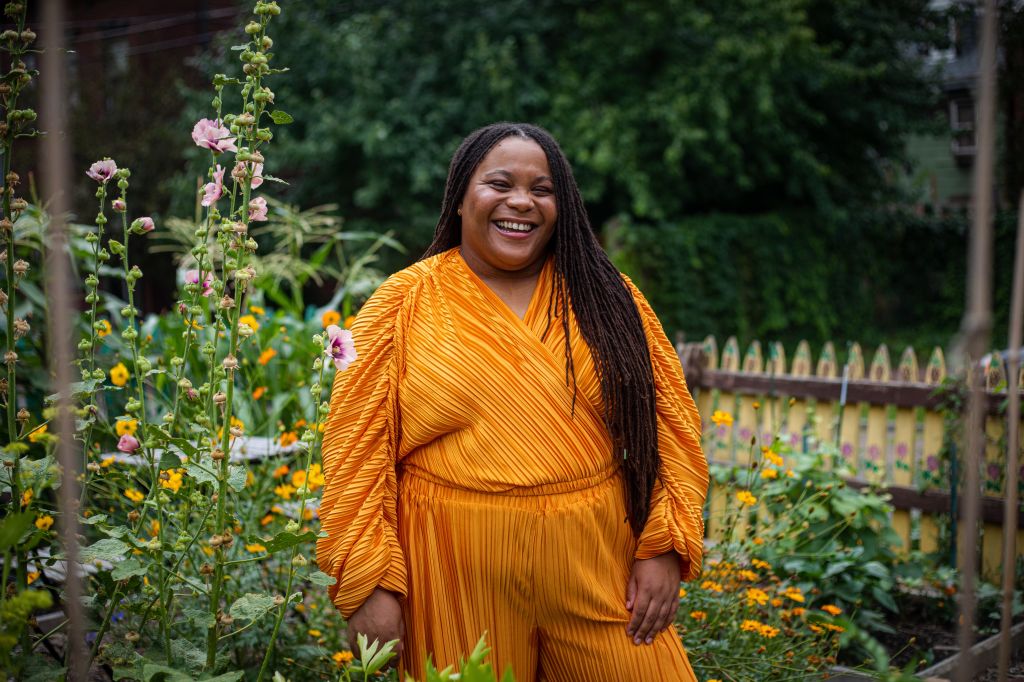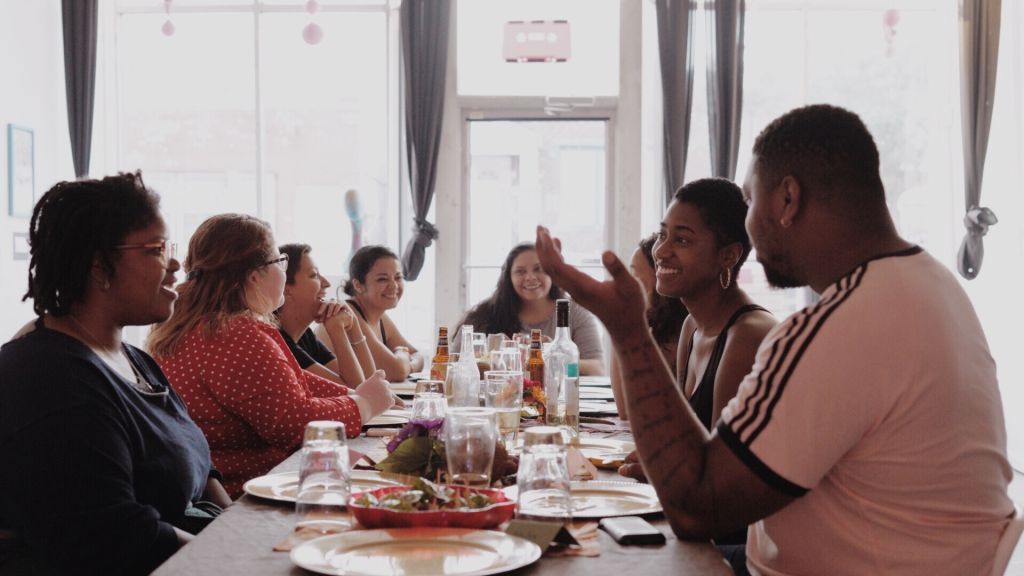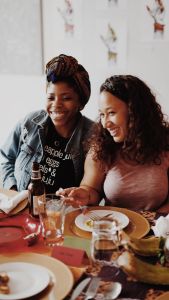Source: iOne Digital Creative Services
For Dominique Chestand, a filmmaker, visual artist, and comedian, adopting a meatless diet felt like an obvious choice after doing a project on the meat industry as a teen. Chestand recalls feeling disturbed learning about the damage consuming meat does to animals and the ozone layer and never looked back. But having eschewed meat since the age of 15, Chestand is also keenly aware that a meatless diet doesn’t always appear immediately accessible to the Black community.
Enter Broke Babe Supper Club, a multimedia project, which Chestand created to host pop-up dinners offering vegetarian and vegan foods to low-income communities, artists, and people of color. Through photography, art, and digital storytelling—along with a satisfying meal—Broke Babe Supper Club raises awareness about vegan and vegetarian recipes, community resources, and organizations working to alleviate food insecurity.
NewsOne Presents Still Blooming In The Whirlwind: Pittsburgh As A Black Cultural And Artistic Mecca
In Chestand’s view, standard arguments like “climate change” and “animal rights” aren’t the most appealing for all audiences. More than that, she says, the face of veganism has long been that of condescension and alleged deprivation. Still, the benefits are plentiful, and she wants the Black community to be able to reap them no matter their level of income.
“I don’t want to force it on people, because there’s such a condescending culture around vegetarianism and veganism and the majority of that condescension comes from white communities and I’m completely trying to avoid that,” says Chestand, whose work explores the experiences of Black, queer, women, and otherwise marginalized identities. “The goal is to make sure that the people in my community have longer lifespans and just to make sure that [they] enjoy the food that they eat.”

The table is set: Broke Babe Supper Club’s very first dinner at AMFM Gallery (Chicago) in 2018. | Source: @senseishutter
The first iteration of the project took place in 2018 when Chestand was living in the South Side of Chicago and financially struggling. What helped her survive was getting creative with ingredients. Chestand wanted to pass on the discoveries she’d made, so she created the project to help those in need survive while still enjoying food that balanced being healthy with tasting good.
“I wanted to create a community resource that helps people survive in moments where they don’t really know what to do in terms of food,” Chestand says. “Or when they’re tired of what they’ve been experiencing in the kitchen and they want to make what they’re eating more exciting, because I see cooking as an art form.”

Filmmaker, visual artist, comedian and arts administrator Dominique Chestand. | Source: Rayni Shiring / Rayni Shiring
As the operations manager of Shiftworks Community + Public Arts, which was founded as the Office of Public Art in 2005, Chestand works with artists, community partners, and Shiftworks staff to ensure equitable and effective practices at the intersection of public art and civic engagement. Chestand holds a bachelor’s degree in Theatre and Communication Arts from the University of Wisconsin-Madison, and as an arts administrator and consultant, she has worked with organizations such as the Danish Arts Council, Young Chicago Authors, and the Los Angeles Dance Project.
By her own admission, Chestand says she has dabbled in almost every art form at least once. Her position at then the Office of Public Art brought her to Pittsburgh in 2021. Since then, she’s also acted as the coalition coordinator for the Visual Arts Coalition for Equity. Looking back, Chestand says what matters most is supporting causes and using the most effective medium to push the conversation forward.
“I’m kind of all over the place when it comes to which art forms that I utilize to create.
For me, it’s less about selecting a medium and more about the goal of that work of art, and the best medium for that,” Chestand says.
The 2018 version of Broke Babe Supper Club revolved around a series of photographs that focused on single ingredients that Chestand called food stamp staples, meaning low-cost ingredients that can help low-income consumers feed themselves. The goal of the photos displayed and the dinners she hosted was to gain a following where she could share the accessibility of low-cost vegan food. Showing people that there are many different flavors of vegan and vegetarianism was foundational for Chestand.

Broke Babe Supper Club: Gathering low-income communities, artists, and people of color to raise awareness of food and social justice. | Source: @senseishutter
“That was to show especially Black people that vegan cuisine is not just for the granola white audience. It can be adapted to our tastes, to the foods we historically eat,” Chestand says. “[In] my experience, especially as someone who’s been vegetarian for nearly two decades, you mention the word vegan or vegetarian in a room full of Black people and ears tend to close.”
Yet the plant-based movement seems to be gaining traction in the Black community. As of 2016, an estimated 8% of Black Americans are vegetarian or vegan in comparison to the 4% of the overall population. Yet, as of 2022, 1 in 5 Black households have experienced food insecurity, and in the case of Allegheny County, 19.4% of households were food insecure as of 2020.

Breaking bread: Chestand’s new project wants to build and heal communities from the inside out. | Source: @senseishutter
Ironically, Chestand says, the first 2018 Broke Babe Supper Club ended due to her own struggles with poverty. Now, having recently received funding to support Broke Babe Supper Club, Chestand feels even more empowered to educate consumers while examining food insecurity. An added aspect of the project includes traveling to cities such as Chicago, Los Angeles, and New York to study food insecurity while visiting food banks, community gardens, and urban farms to gain insight into solutions. In the updated version of Broke Babe Supper Club, viewers will learn more about low-cost ingredients by scanning a QR code that takes them to info about the item as well as an inexpensive recipe.
“This is not something that I’m selling, I want this resource to be free. People have asked me, ‘why aren’t you doing the cookbook?’ And I’m like, ‘because a cookbook costs money,’” Chestand said. “I’m not trying to create a barrier to this resource that I’m creating. I want this to be a resource that is free and open to the public.”
Chestand says the project is in its early stages. She has spent much of 2024 researching and creating photographs associated with the recipes she comes up with. Chestand plans to start hosting events and launch an online platform in 2025.
“We have to be the leaders within our own communities,” Chestand said. “Whatever gaps exist in our communities we have to fill first because doing it the other way around just doesn’t work.”
Atiya Irvin-Mitchell is a Pittsburgh-based freelance writer. She can be reached at airvinmitchell@gmail.com and you can follow her on Twitter @AtiyaWrites.
SEE ALSO:
Zuly Inirio Is On A Mission To Correct Opera Music’s Historical Oversights
Playwright a.k. payne Invites Pittsburgh Artists To Build Collaborative, Creative Space






